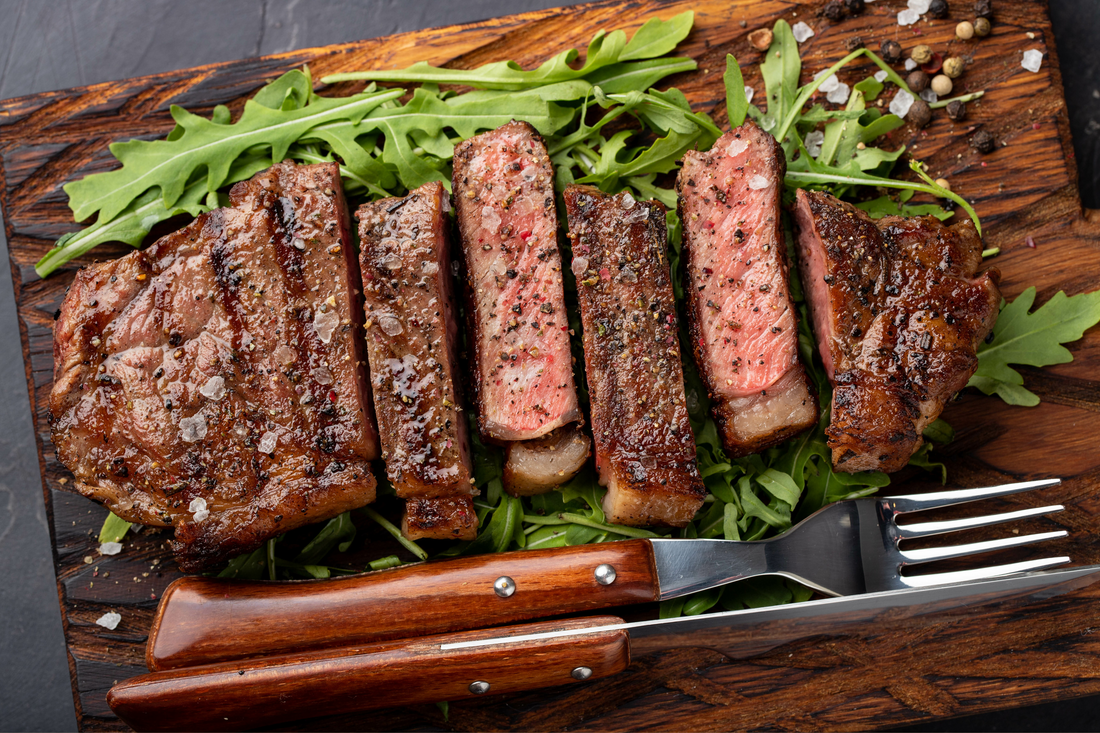
So, what is dry aging:
It is when a meat processor places the whole beef in a controlled open-air environment, putting the meat through a flavor transformation journey!!
Yeah, that sounds epic, right????
What does dry aging do to the meat:
"By exposing the meat to air, moisture is pulled out and the natural enzymes in the beef break the muscles down slowly over time, making it more tender. When the surface of the beef dries, it creates a crust over the muscle, but what's inside stays moist and red."
-By: stanbroke
What you know:
Most store-bought beef is wet-aged, it was sealed to hold the moisture in a pack. The same chemical reaction occurs as it would in dry-aging to wet-aging.
But the difference is in the flavor, which is the vital part cause it affects our taste buds.
"1. Moisture is pulled out of the meat. The fat portion retains more water than the lean portion, causing the lean muscle to shrink around the fat; the fat becomes more pronounced, thus giving the beef more flavor.
2. Bacteria formed in the aging process produces a robust flavor profile that is highly desirable. "It's like cheese," says Aaron. "It's very rich and intense." In fact, if you look at a rib of dry aged beef, you can see veins similar to those found in blue cheese working their way through. Both the mold, and the flavor profiles, are indeed similar."
But you might say gross.....
Dry-aging has been something that has been happening for thousands of years, in times when our luxury of fridges was not available. It is a tried and true method, and it is ummm amazing.
But how does this fantastic process not like make the meat go bad?
Uh, well, this is why we hire a professional to do this amazing work, not to let beef rot, but "age" is the key!
It's all in the butcher's consistency in keeping a controlled decomposition.
Three factors he needs to keep in mind are:
Airflow to help form a crust, humidity control slows down moisture migration and keep natural juices from running out, and temperature control will stop the meat from spoiling.
It makes a difference:
This is why you would buy from a small family-operated ranch because our beef is not wet-aged!
It's dry-aged, and the smell from cooking a dry-aged steak to wet-aged steaks is 1,000 points better to your senses!!
The difference in our dry-aged beef is the smell of a delicious steak sizzling on the grill, and yep.... To make your mouth water!
"Butchers usually hang up beef when dry aging it because hanging helps the muscles "relax," reports Sam Wass of Medium Well (via The Great British Meat Co.). It works to break down the fibers so the meat become softer. A properly hung cut of meat will also lose weight through the decomposition process, as "drip loss" occurs."
Can you do it yourself:
You bet you can, but.... ya got to do it right!
"The meat is also protected by the bones and fat which is why, if you're dry aging at home, it's important to choose high quality large cuts with the bones still in. (Think of it like a bone shield.) Once the aging process is completed, the dried-out layers around the exterior are cut away, leaving you with a beautifully aged, edible dark-red piece of meat."
Even for your health:
Believe it or not but dry-aged beef can be like waaaay better for you. Read this!
"However, increasing the tenderness of red meat can make it easier for you to digest it. So if you sometimes have trouble with digestion after eating a big steak, opting for a dry-aged one could help. But ultimately, dry-aged beef is still beef, and evidence says eating red meat too often or in large portions can be a health risk."
I know, crazy right?
Well, I'll let you know because you are probably seeing how my mind works by me going on and on about this. Ahahah, I get a bit too enthusiastic about stuff like this!
But hey, if you never knew, now you do, thanks to your Mercy Meadows Rancher.

